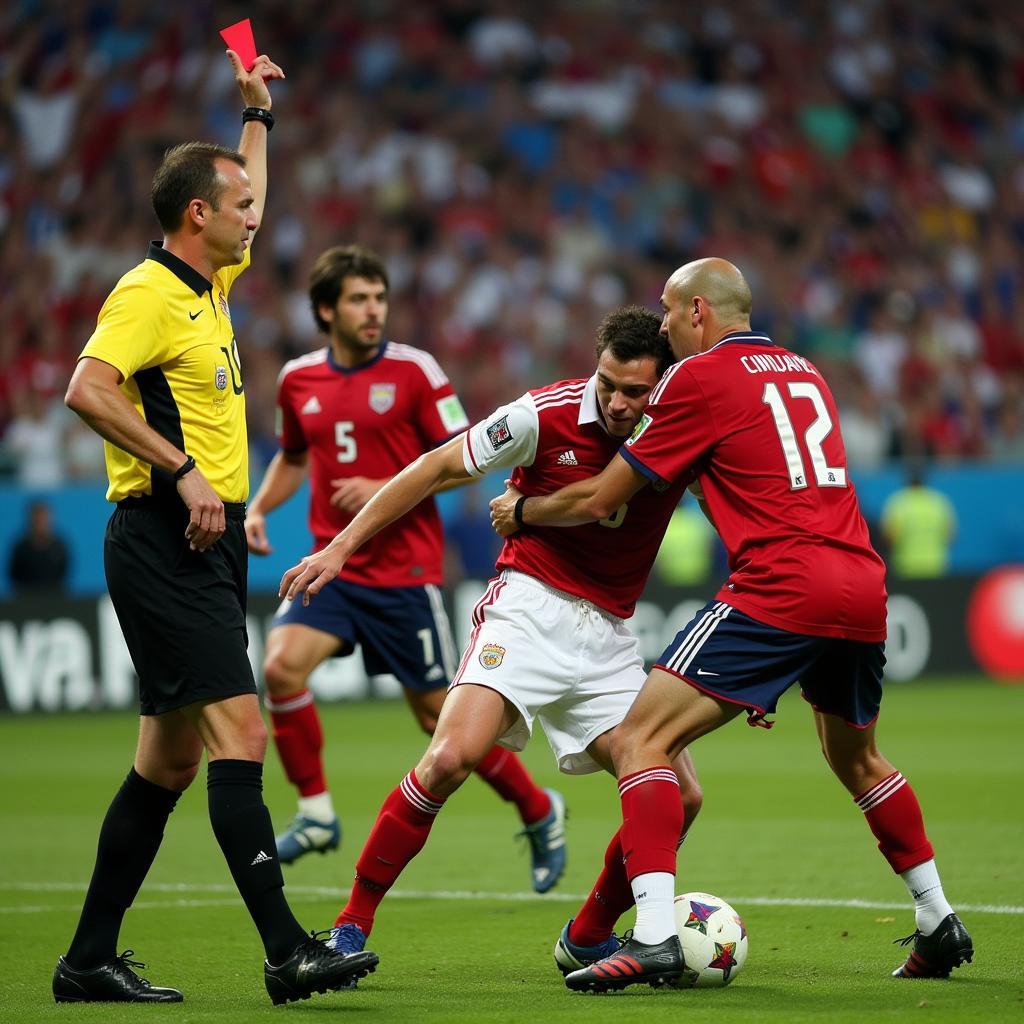The 2006 World Cup final, a clash between titans Italy and France, will forever be remembered not only for the Azzurri’s victory but also for the controversial red card brandished by referee Horacio Elizondo. This incident, involving Zinedine Zidane and Marco Materazzi, became a defining moment of the tournament, raising questions about the role of the World Cup 2006 final referee.
Who Was the World Cup 2006 Final Referee?
Horacio Marcelo Elizondo, an Argentine former international football referee, was the man in the middle for the 2006 World Cup final. His appointment to officiate such a high-stakes match was a testament to his experience and reputation within FIFA. Elizondo, known for his calm demeanor and decisive decision-making, had a distinguished career officiating in the Argentine Primera División before rising to the international stage. He also officiated at the 2006 world cup qualifying stages.
The Zidane-Materazzi Incident: A Referee’s Dilemma
The defining moment of Elizondo’s career, and arguably one of the most controversial moments in World Cup history, came in extra time of the 2006 final. After a verbal exchange, Zidane reacted to a provocation from Materazzi by headbutting the Italian defender in the chest. The incident occurred away from the main action, leaving Elizondo initially unaware of what had transpired.
The Assistant Referee’s Crucial Role
Crucially, it was fourth official Luis Medina Cantalejo who, observing the incident on a monitor, informed Elizondo via headset. This communication was vital, as it allowed Elizondo to make the correct decision despite not witnessing the foul firsthand. Elizondo then marched towards Zidane and, after a brief consultation with his assistant referee, Dario Garcia, issued a red card to the French captain. This decision effectively ended Zidane’s international career, sending shockwaves through the footballing world.
The Aftermath and Elizondo’s Legacy
The decision to send off Zidane was met with initial confusion and then widespread debate. Some argued that Elizondo had been overly harsh, while others maintained that the red card was justified given the severity of the foul. However, replays confirmed the violent nature of Zidane’s action, validating Elizondo’s decision.
Elizondo’s Post-Match Comments
Elizondo later explained that he had no choice but to dismiss Zidane, emphasizing that the rules dictated a red card for such violent conduct. He remained steadfast in his decision, highlighting the importance of upholding the laws of the game, regardless of the player or the occasion. He went on to have a successful career after the final, solidifying his place as a respected figure in refereeing. He even officiated matches in the Argentina world cup 2006 campaign.
“My job was to apply the rules of the game. Zidane’s action was a clear red card offense, and I had a duty to act accordingly,” Horacio Elizondo, former FIFA referee.
A Lasting Impact on Refereeing
The incident highlighted the increasing role of technology and communication in modern football refereeing. It also underscored the immense pressure referees face in making split-second decisions on the biggest stage.
Was the Red Card Justified?
Considering Zidane’s headbutt and the rules of the game, the red card was the correct decision. While the incident overshadowed the match, Elizondo’s actions showcased the importance of impartial and consistent refereeing.
David Beckham’s red card in the 1998 World Cup, while different in circumstance, also highlights the importance of referee decisions in shaping tournament narratives. You can read more about it here: david beckham red card 1998 world cup. Understanding Argentina’s overall World Cup performance adds another layer to the context surrounding Elizondo. Explore their track record at argentina world cup performance. This was also the first World Cup for Cristiano Ronaldo, and you can delve into his debut performance here: cristiano ronaldo first world cup.
Conclusion
The World Cup 2006 final referee, Horacio Elizondo, played a pivotal role in one of the tournament’s most controversial moments. His decision to send off Zidane, while difficult, was ultimately correct and demonstrated his commitment to upholding the laws of the game. The incident remains a key talking point in World Cup history, serving as a reminder of the high stakes, intense emotions, and critical decisions that shape the beautiful game.
FAQ
- Who was the referee for the 2006 World Cup final? Horacio Elizondo.
- Why did Zidane get a red card in the 2006 World Cup final? He headbutted Marco Materazzi.
- Did Elizondo see the headbutt? No, he was informed by the fourth official.
- Was the red card justified? Yes, according to the rules of the game.
- What was the outcome of the 2006 World Cup final? Italy won on penalties after a 1-1 draw.
- What is Horacio Elizondo doing now? He is retired from refereeing.
- What impact did the incident have on refereeing? It highlighted the increasing role of technology and communication.
Mô tả các tình huống thường gặp câu hỏi
Một số người hâm mộ vẫn đặt câu hỏi về việc liệu Materazzi đã nói gì với Zidane để dẫn đến hành động của anh. Mặc dù bản chất chính xác của cuộc trao đổi vẫn chưa được biết rõ, nhưng rõ ràng đó là một lời khiêu khích cá nhân sâu sắc.
Gợi ý các câu hỏi khác, bài viết khác có trong web.
- Bạn có muốn tìm hiểu thêm về vòng loại World Cup 2006 không?
- Bạn có tò mò về thành tích của Argentina tại các kỳ World Cup?

